Earth Observations' Impacts ON Society
Earth observations play an integral role in society. Decision makers use them to plan our cities, protect our environment, and support healthy communities. But the problems we tackle are complex, and the impacts of Earth data aren’t always immediately obvious. That’s why we have the Socioeconomic Assessments initiative.
The Socioeconomic Assessments initiative measures the costs and benefits of using Earth science information to make decisions. We look at lives and dollars saved, damage prevented, and other benefits to people and the planet. We do this by creating transdisciplinary teams of Earth and social scientists working together to share knowledge and experience. These teams aim to identify new approaches for assessing the value of Earth science for societal benefit.
Collaborative Network for Valuing Earth Information (CONVEI)
From improving response to heat emergencies to protecting ecosystems vital to local tourism, NASA data help decision makers protect their communities every day. But many still don’t know that such data exists – or the value it can provide.
The Collaborative Network for Valuing Earth Information (CONVEI) aims to change that by bringing diverse perspectives to the table. CONVEI develops new ways to measure and share the human, environmental, and economic benefits of using Earth data.
An Interagency Effort
The World Wildlife Fund (WWF) leads CONVEI, in collaboration with NASA, the National Oceanic and Atmospheric Administration (NOAA), and the United States Geological Survey (USGS). The $8.5 million effort will create a community of practice across disciplines – focusing on those outside of Earth science. NASA is contributing $6 million to the five year effort.
VALUABLES Consortium
VALUABLES is a collaborative initiative between NASA and Resources for the Future (RFF) that concluded in 2023. This initiative measured the economic and societal benefits of Earth data through impact assessments. These studies span a range of applications, including conservation, agriculture, and disaster response.
GEOVALUE
GEOValue is an international initiative focused on assessing the value of science for environmental decision making. To learn more, visit the Group on Earth Observations (GEO) landing page.

